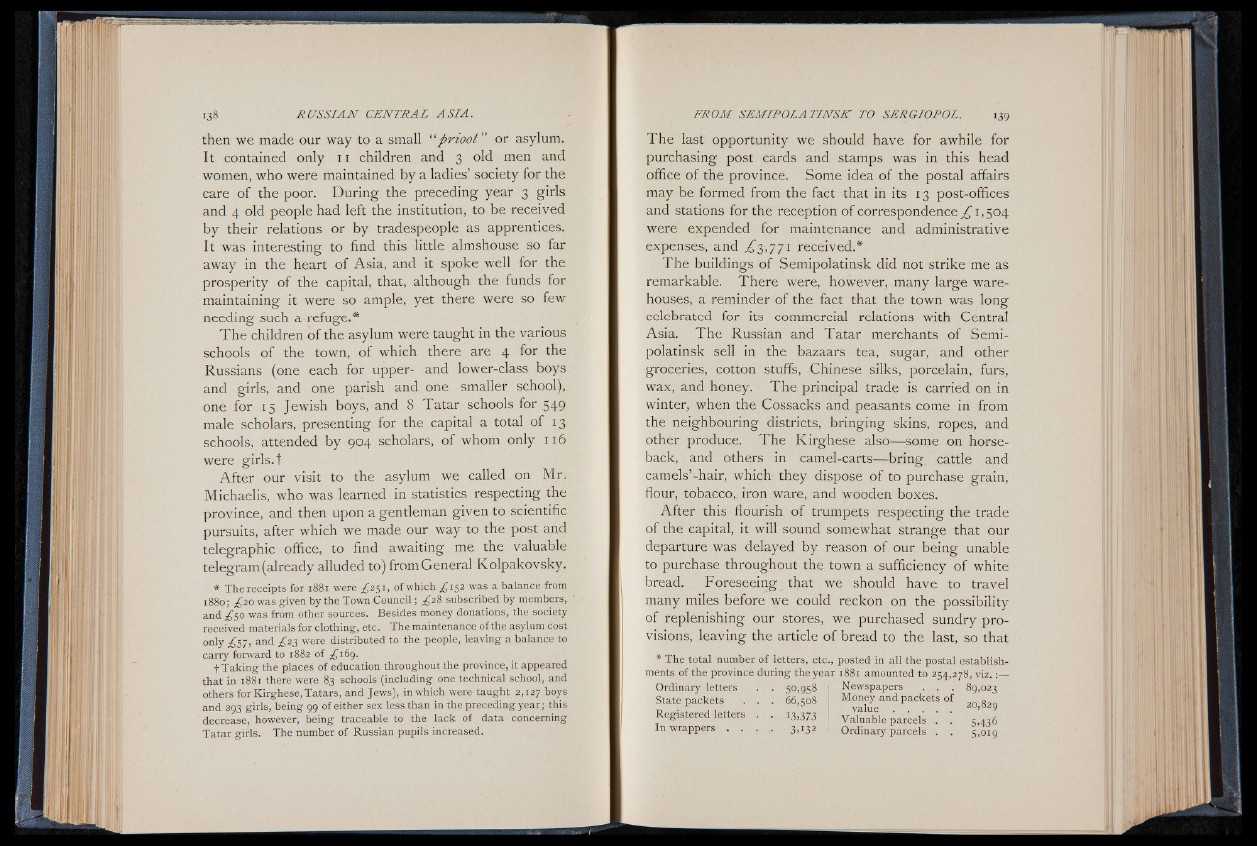
then we made our way to a small “ prioot" or asylum.
It contained only n children and 3 old men and
women, who were maintained by a ladies’ society for the
care of the poor. During the preceding year 3 girls
and 4 old people had left the institution, to be received
by their relations or by tradespeople as apprentices.
It was interesting to find this little almshouse so far
away in the heart of Asia, and it spoke well for the
prosperity of the capital, that, although the funds for
maintaining it were so ample, yet there were so few
needing such a refuge.*
The children of the asylum were taught in the various
schools of the town, of which there are 4 for the
Russians (one each for upper- and lower-class boys
and girls, and one parish and one smaller school),
one for 15 Jewish boys, and 8 Tatar schools for 549
male scholars, presenting for the capital a total of 13
schools, attended by 904 scholars, of whom only 116
were girls, t
After our visit to the asylum we called on Mr.
Michaelis, who was learned in statistics respecting the
province, and then upon a gentleman given to scientific
pursuits, after which we made our way to the post and
telegraphic office, to find awaiting me the valuable
telegram (already alluded to) from General Kolpakovsky.
* The receipts for 1881 were ¿2 5 1 , ofwhich ¿ 15 2 was a balance from
1880; ¿20 was given by the Town Council ; ^28 subscribed by members,
and was from other sources. Besides money donations, the society
received materials for clothing, etc. The maintenance of the asylum Cost
only ¿ 5 7 , and ¿2 3 were distributed to the people, leaving a balance to
carry forward to 1882 of ^169.
f T ak in g the places of education throughout the province, it appeared
that in 1881 there were 83 schools (including one technical school, and
others for K irghese, Tatars, and Jews), in which were taught 2,127 b° y s
and 293 girls, being 99 of either sex less than in the preceding year; this
decrease, however, being traceable to the lack of data concerning
Tata r girls. The number of Russian pupils increased.
The last opportunity we should have for awhile for
purchasing post cards and stamps was in this head
office of the province. Some idea of the postal affairs
may be formed from the fact that in its 13 post-offices
and stations for the reception of correspondence £ 1,504
were expended for maintenance and administrative
expenses, and ^3,771 received.*
The buildings of Semipolatinsk did not strike me as
remarkable. There were, however, many large warehouses,
a reminder of the fact that the town was long
celebrated for its commercial relations with Central
Asia. The Russian and Tatar merchants of Semipolatinsk
sell in the bazaars tea, sugar, and other
groceries, cotton stuffs, Chinese silks, porcelain, furs,
wax, and honey. The principal trade is carried on in
winter, when the Cossacks and peasants come in from
the neighbouring districts, bringing skins, ropes, and
other produce. The Kirghese also— some on horseback,
and others in camel-carts— bring cattle and
camels’ -hair, which they dispose of to purchase grain,
flour, tobacco, iron ware, and wooden boxes.
After this flourish of trumpets respecting the trade
of the capital, it will sound somewhat strange that our
departure was delayed by reason of our being unable
to purchase throughout the town a sufficiency of white
bread. Foreseeing that we should have to travel
many miles before we could reckon on the possibility
of replenishing our stores, we purchased sundry provisions,
leaving the article of bread to the last, so that
* The total number of letters, etc., posted in all the postal establishments
of the province during the year 1881 amounted to 254,278, viz. :_
Ordinary letters . . 50,958 I Newspapers . . . 89,023
State packets . . . 66,508 Money and packets of 2^ g
Registered letters . . 13,373 I V i a b l e parcels ! ! 5,436
In wrappers . . . ,. 3,132 1 Ordinary parcels . . 5,019